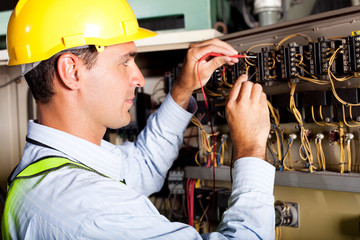Whether you need electrical work in your home, office, or commercial building, you will want to choose an electrician with the right skills to do the job. An electrician is an expert in installing and repairing electrical equipment and may maintain existing infrastructure. Maintenance electricians work in virtually every industry. Whether in industrial, commercial, or residential settings, maintenance electricians are responsible for maintaining electrical power systems. Electrician diagnoses problems, test equipment, and repair or replaces components. They may also consult with other professionals in the industry, such as architects and heating and air conditioning technicians.

Electricians may also be required to work outdoors, such as on off-shore marine vessels. In addition, they may work at great heights or in cramped spaces. They may use different hand tools, such as drills, saws, and cable testers. They may also use thermal scanners to determine problems with electrical wiring. Electrical workers also install new power systems and maintain existing ones. They may replace circuit breakers and motors and install voice/data/video equipment, street lights, and security systems.
Commercial electricians specialize in installing, repairing, and maintaining electrical systems. Typical tasks of commercial electricians include repairing and maintaining electrical systems in buildings. They also install new equipment and connect wireless devices. Depending on the building, they may also assist in the design of the electrical systems.
Commercial electricians need to have a strong grasp of how electrical systems work. They should also be familiar with energy-saving technologies and be able to install them safely. They should also be able to work with a team and communicate well with clients. The electrical industry is projected to grow by about 84700 jobs over the next decade. This number is projected to rise in part because more businesses are moving into commercial buildings. It is also expected that a growing number of electricians will be needed to link alternative power sources to homes. In addition, many electricians will move into management or become electrical inspectors.
Whether you’re looking to get started in the electrical trade or you’re just looking for a career change, an electrician job might be right for you. There’s no shortage of jobs in this industry and electricians can work in a variety of settings. They may be called to work in residential homes, major factories, hospitals, or even industrial facilities.
The pay for electricians can vary, depending on the type of work they do, their education level, and the region they work in. But there’s one consistent thing: electricians enjoy high wages. This is due in part to the competitive nature of the industry. The majority of electricians work full-time. Some may work on a contract basis, while others may be called in on an emergency basis. Some may work in a restricted space, such as a submarine. Some electricians work in remote areas that aren’t easily accessed by trucks.
Unlike a typical electrician, an inside wireman is a specialized type of electrician who installs and maintains various electrical systems in commercial and industrial facilities. An inside wireman uses simple hand tools and power-assisted tools to install and maintain electrical systems. In addition to electrical systems, an inside wireman may also be responsible for security and fire alarm systems.
An inside wireman typically works full time. The duties of an inside wireman may include installing electrical equipment, installing lighting units, repairing electrical outlets, and connecting buildings to an external power source. The work may require overtime to meet deadlines.
An inside wireman is a skilled technician who has completed an apprenticeship program. An apprenticeship program is a five-year training program that teaches prospective electricians the skills they need to become an inside wireman. Upon completion, apprentices become journeyman electricians through their local union.
Installer technician and residential wiremen. Several different types of installers and technicians abound. Most of them work in or around the construction industry and may be self-employed or employed by a construction company. They may work on residential homes, new construction and even older buildings. They may be expected to install circuits, light fixtures and even install new wiring in between lighting fixtures.
There are several advantages to becoming an installer and technician, including a hefty salary and an enviable set of benefits. A true professional would take their responsibilities seriously, and they would not be afraid to show off. In fact, they would likely have a good time and have some fun in the process. Aside from being a great guy to have around, they would be well rewarded for their efforts.
